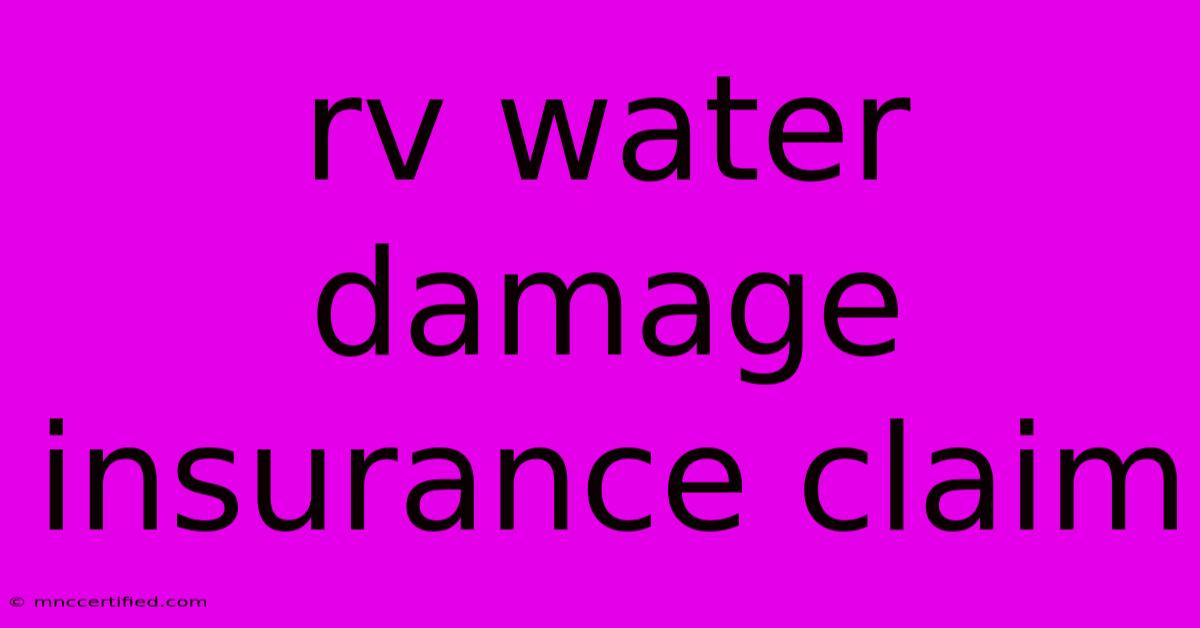Rv Water Damage Insurance Claim

Table of Contents
RV Water Damage: Navigating Your Insurance Claim
Dealing with water damage in your RV is a nightmare, but knowing how to navigate your insurance claim can significantly ease the stress. This comprehensive guide will walk you through the entire process, from initial assessment to final settlement. We'll cover crucial steps to maximize your chances of a successful claim and minimize potential headaches.
Understanding Your RV Insurance Policy
Before you even think about filing a claim, thoroughly review your RV insurance policy. Understand your coverage, deductibles, and what constitutes "covered damage." Many policies cover water damage resulting from sudden and accidental events like:
- Leaks from plumbing systems: Burst pipes, faulty seals, or leaking faucets.
- Roof leaks: Damage caused by rain, snow, or hail entering through a compromised roof.
- Appliance malfunctions: Water damage from a malfunctioning washing machine, refrigerator, or water heater.
- Acts of nature: Flooding from severe weather events.
However, pre-existing conditions or damage from neglect are usually excluded. For example, if you knew about a slow leak and failed to address it, your claim might be denied. Documenting regular maintenance is crucial to support your claim.
Identifying the Source of Water Damage
Pinpointing the source of the damage is paramount. Take clear photographs and videos of:
- The affected areas: Show the extent of the water damage, including walls, floors, furniture, and appliances.
- The potential source: Document any visible leaks, cracks, or other signs of damage to plumbing, roofing, or appliances.
- The overall condition of your RV: This provides context for the damage and helps establish a baseline for repairs.
Detailed documentation is your best friend. It strengthens your claim and reduces the possibility of disputes with your insurance company.
Filing Your RV Water Damage Insurance Claim
Once you've documented the damage, contact your insurance provider immediately. Follow these steps:
-
Report the damage: File a claim through your insurance company's preferred method (phone, online portal, or app). Provide them with all relevant information, including the date and time of the incident, a description of the damage, and your policy number.
-
Cooperate with the adjuster: An adjuster will likely be assigned to assess the damage. Cooperate fully, providing access to your RV and answering their questions honestly. Their assessment will determine the extent of the coverage.
-
Negotiate the settlement: If you disagree with the adjuster's assessment, don't hesitate to negotiate. Provide supporting documentation (photos, receipts for previous repairs, etc.) to strengthen your case. Consider seeking legal counsel if you feel the settlement is unfair.
-
Choose a reputable repair shop: Your insurance company may have preferred vendors, but you're usually entitled to choose a reputable repair shop. Ensure the shop is experienced in RV repairs and has positive reviews. Obtain multiple quotes before making a decision.
Preventing Future Water Damage
Proactive measures can prevent future water damage and protect your investment.
- Regular inspections: Conduct regular inspections of your RV's plumbing, roof, and appliances. Look for leaks, cracks, or signs of wear and tear.
- Preventative maintenance: Address any issues promptly. Replacing worn-out seals, fixing leaks, and servicing appliances regularly can prevent costly damage.
- Proper winterization: If you store your RV during winter, ensure it's properly winterized to prevent freezing pipes and water damage.
Keywords for SEO Optimization
This article naturally incorporates various keywords, including: RV water damage, RV insurance claim, RV water damage insurance claim, insurance claim process, RV repairs, RV maintenance, preventing water damage in RV, RV leak repair, RV roof leak, plumbing leaks in RV, filing an insurance claim, insurance adjuster, RV insurance coverage. The strategic use of these keywords throughout the text ensures better search engine optimization without compromising readability.
By following these steps and proactively maintaining your RV, you can significantly improve your chances of a successful insurance claim and minimize the disruption caused by water damage. Remember, documentation and communication are key to a smooth and positive outcome.

Thank you for visiting our website wich cover about Rv Water Damage Insurance Claim. We hope the information provided has been useful to you. Feel free to contact us if you have any questions or need further assistance. See you next time and dont miss to bookmark.
Featured Posts
-
Access Dec 10 2024 Pdf Now
Dec 10, 2024
-
Yellowstone Bella Hadid Cameo Stuns Fans
Dec 10, 2024
-
Sora Released Open Ais New Video Model
Dec 10, 2024
-
Nationwide 100 Bonus Eligible Accounts
Dec 10, 2024
-
Eras Tour Record Revenue More To Come
Dec 10, 2024